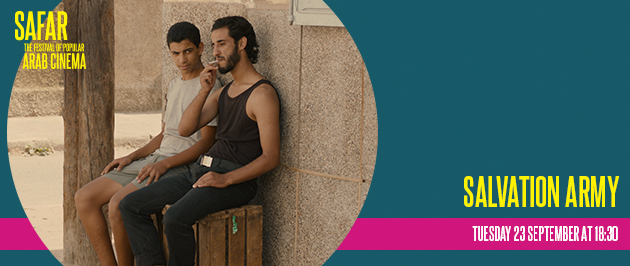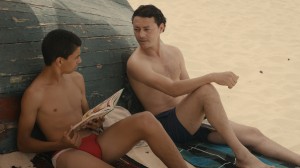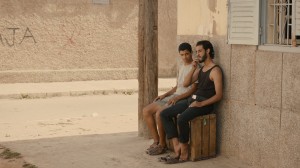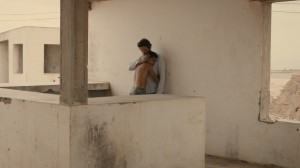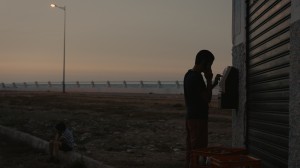Salvation Army
Directed by Abdellah Taïa
2013 | Morocco
Abdellah Taïa is a Moroccan author who has written a series of semi-autobiographical novels about his struggles and ambitions whilst growing up as a gay man in Mororcco. He was also one of the first Moroccan writers to come out, and his directorial debut Salvation Army drew heavily from his memoir L’Armée du salut set in Rabat, Tangier and Geneva.
The book has been described by Taïa’s publishers Semiotext(e) as ‘burn[ing] through the author’s first-person singularity to embody the complex mélange of fear and desire projected by Arabs on Western culture, and moves towards restituting their alterity.’
The movie, a French-Moroccan-Swiss production, gave the Arab world its first gay protagonist, according to Colleen Barry of the Huffington Post. In 2013 the film was shown in Venice and Toronto film festivals, and earlier this year, in February, it was screened at the National Film Festival of Tangier. Awarded the Grand Prix at the Angers Film Festival in France, it is sensitive and sensual and begins with the story of 15-year old Taïa (Said Mrini) who does seem immersed, like the writer, in the sights and sounds of his claustrophobic Moroccan family and village.
Taïa has given a series of revealing interviews. As he told Interview magazine: ‘Hay Salam is the name of the neighbourhood where I grew up … Everything I have known about the world comes from this city and this neighbourhood … The house where I lived there was very small, only three rooms for eleven people. One room for my father, the second for my older brother, Abdelkebir, who exerted a big influence on me, and the last one for the rest of the family: my mother, my six sisters, my little brother and me. Life for me still revolves around these three rooms. The tastes, the smells, the images, the ideas of fear and transgression [all come] from this house, this poor family that I love and hate at the same time …
‘For many years, we were really poor, we didn’t have enough food and we fought with each other a lot. The power structures within the family were a mirror of the dictatorship Morocco was living under at that time.’
Taïa’s enormously influential elder brother Abdelkebir introduced him to popular culture, from James Brown to Ang Lee and the Egyptian writer Tawfiq al-Hakim. Taïa admitted that Egyptian cinema, with its unveiled women and alcohol-drinking characters, gave him hope as a youngster who was sometimes targeted as a young juvenile. One chilling story that he recounted in a New York Times opinion piece was about a group of drunken men from the village congregating at his house and calling for the young boy to be sent down to them for sex. The author expected his older brother to defend him instead his family became only more ashamed. After that he radically changed his life. He carefully disguised who he was as to protect himself and from then on, thought about how he would eventually leave his country.
In the film, the young Abdellah is an object of desire for the older men in the village. Estranged by his mother and a father who beats her, he is under the spell of his older, more accomplished brother. Halfway through, the film fast-forwards to Abdellah in his twenties, at first the paramour of a professor from Geneva who helps him. But then something in Abdellah sours, and he waits for his scholarship to a Swiss university to start, living in a Salvation Army hostel. The ending of the film with the song ‘Ana lak ala toul’ (‘I am for you forever’) by Abdel Halim Hafez is incredibly moving.
After the publication of Taïa’s second book, a collection of short stories, Le Rouge du Tarbouche (The Red of the Fez) in 2004, he came out in a prominent French magazine. The Moroccan press picked up this interview and he was vilified and threatened by blogs that called for him to be stoned. In 2009 the Moroccan government imitated a moral crusade and crackdown on books on culture that threatened traditional Moroccan values. This led Taïa to write ‘Homosexuality Explained to My Mother’, a newspaper piece that his sister read to their illiterate mother. Previous to that he had worked on campaigns and books that addressed disaffected Moroccan youth. The 2011 uprisings have not changed the anti-gay laws in Morocco but now some officials acknowledge gay rights within the wider discussion of human rights.
Nuanced and intriguing, the movie Salvation Army captures the difficult emotions of a young, gay Morocco man looking for survival and a way of escaping the strictures of social prejudice in his country.
– Malu Halasa
London-based journalist writer and editor Malu Halasa is our writer-in-residence. Keep your eyes peeled for her posts in the run-up and during the festival.
For more information and to book tickets, please click here.

